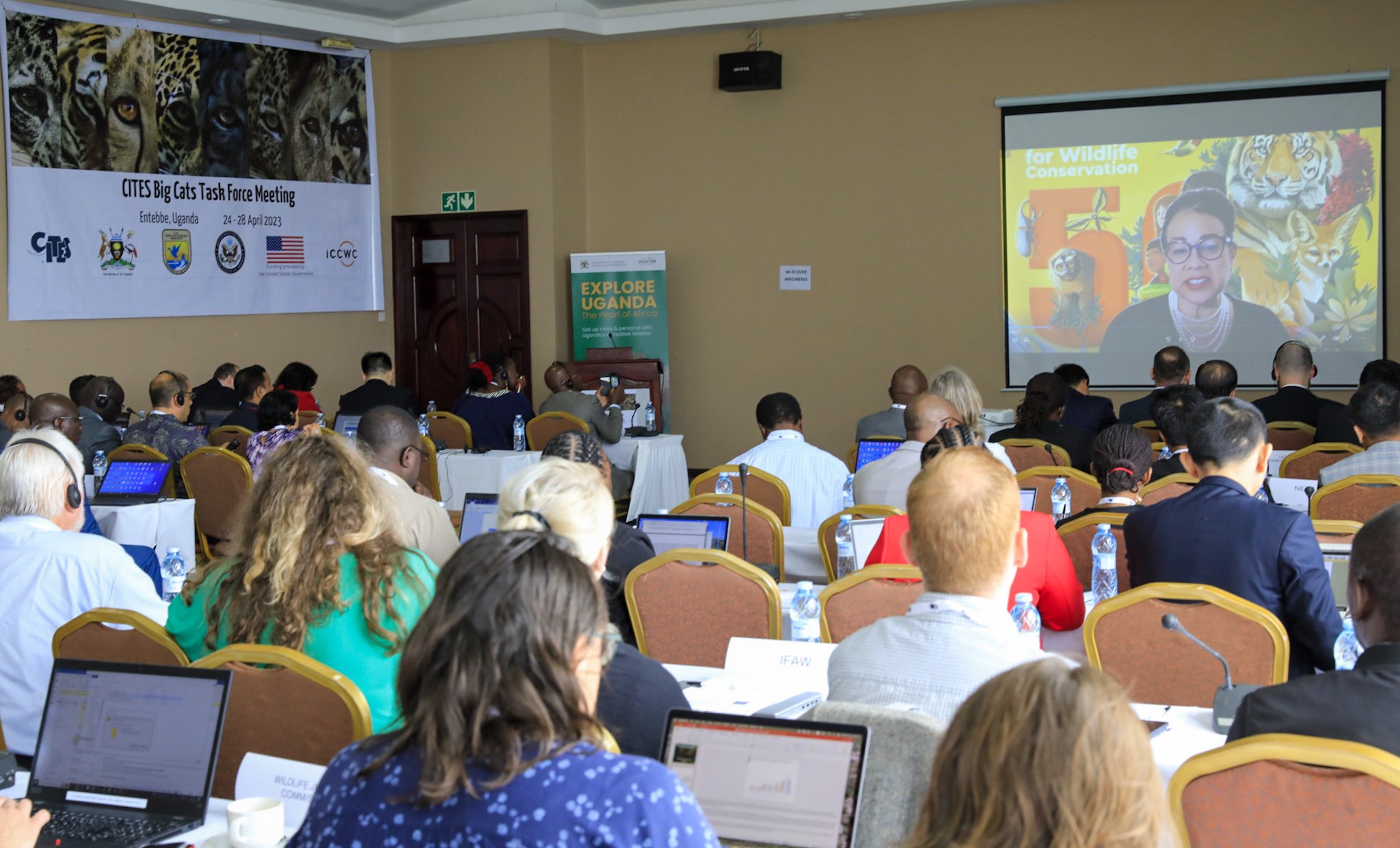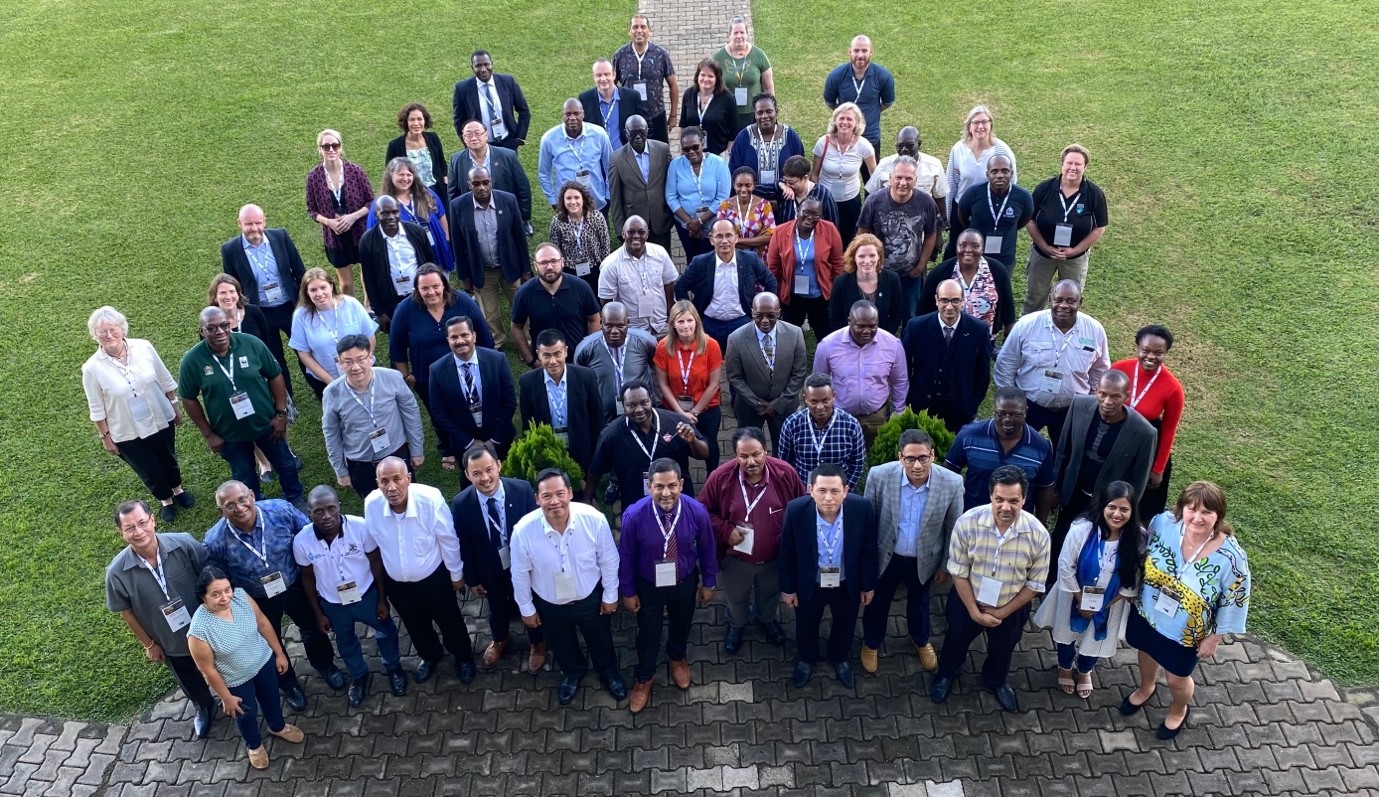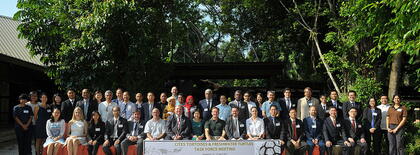
On 24 – 28 April 2023 the CITES Secretariat (The Convention on International Trade in Endangered Species of Wild Fauna and Flora) convened a meeting of the CITES Big Cats Task Force in Entebbe, Uganda, to strengthen responses to the global illegal trade in big cats. Over 70 representatives from 28 countries across Africa, Asia, Europe, North America and South America and representatives from the International Consortium on Combating Wildlife Crime (ICCWC), other international inter-governmental, Regional Wildlife Enforcement Networks and non-governmental organizations, attended the Task Force meeting.
The aim of the Task Force meeting was to develop strategies to strengthen law enforcement responses to combat illegal trade in big cats and their parts and derivatives, focusing on big cat species that are of highest concern from a conservation and illegal trade perspective: Cheetah, Mainland Clouded Leopard, Sunda Clouded Leopard, Lion, Jaguar, Leopard, Tiger and Snow Leopard.
Big cats are affected by illegal international trade and have been targeted over the last several decades for their furs, teeth, bones and other body parts, as well as for live animal trade. Data from the International Union for Conservation of Nature (IUCN) indicates that the global population of tigers in the wild is around 3,000 individuals with a similar figure for snow leopards. The population of wild cheetahs is estimated at approximately 6,500. The population trend for all big cat species focused on at the Task Force meeting is considered to be decreasing.
Effective implementation and enforcement of the regulatory framework established by CITES, play an important role in preventing and addressing the illegal wildlife trade. All big cat species are protected under CITES due to the fact that unregulated and illegal trade poses serious threats to their survival. At the Task Force meeting, there was a strong focus on enforcement and implementation challenges, information and intelligence sharing about the nature of the illegal trade and associated illegal trade routes, sharing knowledge on forensics and other processes in identifying big cat specimens in trade, discussions on the demand for live big cats and strengthening frontline cooperation and coordination. Over the course of the five-day meeting, participants identified best practices and innovative approaches to address this illegal trade and built strong professional relationships with their law enforcement counterparts from other countries.

CITES Secretary-General Ivonne Higuero said: “Over the past century we have been losing big cats, one of the planet’s most majestic predators, at an alarming rate. Today, big cat populations are continuing to diminish, due to habitat loss, human-wildlife conflict, wildlife crime and the illegal trade. In recent years, there has been progress in conservation efforts, coexistence strategies, and enforcement measures to tackle illegal trade in big cats, but more needs to be done. The CITES Big Cats Task Force meeting has provided an opportunity for Parties, IGOs, NGOs and experts to come together to share knowledge and expertise on big cats. The outcomes of this meeting provide inputs to Parties to strengthen responses to illegal trade in big cats.”
The outcomes from the meeting of the CITES Big Cats Task Force will be presented to the 77th meeting of the CITES Standing Committee in Geneva Switzerland in November 2023.
These include measures and activities to:
- Strengthen effective implementation and enforcement of the Convention with regards to illegal trade in big cat specimens.
- Strengthen regulation of facilities breeding big cats in captivity to prevent and detect any illegal trade from such facilities and deploy strengthened enforcement measures.
- Reduce demand to combat illegal trade in big cats
- Identification of big cat specimens in trade.
- Strengthen regional and international collaboration to address illegal trade in specimens of big cats.
The CITES Big Cats Task Force meeting was convened by the CITES Secretariat together with its partners in the International Consortium on Combating Wildlife Crime (ICCWC). It was hosted by the Republic of Uganda and organized thanks to support provided by the U.S. Department of State and the U.S. Fish & Wildlife Service.

For media inquiries, please contact cites-media [at] un.org (cites-media[at]un[dot]org).
More information on the CITES Big Cats Task Force Meeting outcome document can be found here.
About CITES:
CITES - the Convention on International Trade in Endangered Species of Wild Fauna and Flora.
CITES is a legally binding multilateral agreement of 184 Parties, that regulates international trade in more than 40,000 species of wild plants and animals, including their parts and derivatives. Its purpose is to ensure that this trade is legal, sustainable, and traceable.
Find out more:
About ICCWC:
ICCWC - The International Consortium on Combating Wildlife Crime.
ICCWC is a unique partnership of five intergovernmental organizations – The Secretariat of the Convention on International Trade in Endangered Species of Wild Fauna and Flora (CITES), the International Criminal Police Organization (INTERPOL), the United Nations Office on Drugs and Crime (UNODC), the World Bank Group (WBG) and the World Customs Organization (WCO).
Through technical assistance, tools, training, and operational support, ICCWC works along the entire criminal justice chain, building the capacity of frontline law enforcement in countries and regions around the world affected by wildlife crime.
Find out more:
More news
Our Approach
ICCWC's approach focuses on mobilizing a variety of tools and services to build long-term capacity among national agencies responsible for wildlife law enforcement to effectively combat wildlife crime. ICCWC Vision 2030 - Towards a World Free of Wildlife Crime and Strategic Action Plan 2023 - 2016 ICCWC has just launched...



